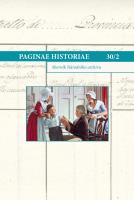Ctnosti moudrost a prozíravost, královská rada a úřady v knížecích zrcadlech doby Václava IV.
The Virtues Wisdom and Prudence, Royal Counsel and Offices in the Mirrors of Princes in the Times of Wenceslas IV
Author(s): Jan VojtíšekSubject(s): History, History of ideas, Middle Ages, 13th to 14th Centuries
Published by: Národní archiv
Keywords: princely mirrors; medieval literature; rulers; child education; manuscripts
Summary/Abstract: An ideal government was described in the mirrors of princes of the Late Middle Ages through prism of the qualities and virtues which the ruling persons should have as well as their administrative apparatus. As there were two virtues – wisdom (sapiencia) and prudence (prudencia) postulated as basic ones in this literature, they are therefore the subject of the study as well as their position in the mirror of princes originated in the Kingdom of Bohemia during the reign of Wenceslas IV. Another point of the study is devoted to the analysis of royal counsellors and officials, their position in the mirrors of princes and their relation to the above-mentioned virtues. The source corpus of the study comprises four works – two mirrors of princes written in Latin, De quatuor virtutibus cardinalibus pro erudition principum by Carthusian Michal of Prague, then the so-called anonymous mirror of princes inscribed to Charles IV and two works written in Czech language, New Advice (Nová rada) by Smil Flaška of Pardubice and Books about Jesters (Kniežky o šašiech) by Tomáš Štítný of Štítné. The analyses of virtues and their position and the interest of the authors in the question of choice of royal counsellors and officials help to rank the individual works within the genre. For example, the work by Michal of Prague shows his moral theoretical bias and in New Advice, political commitment and contemporary topicality of the poem are clearly revealed. Study of the way of choosing counsellors and officials confirms a blunt stress on both above- mentioned virtues at royal counsellors, while the other officials whose roles are characterized mainly by their relation to judicial institutions are connected primarily with justice, joined with benevolence (clemencia) and moderation (temperancia). Then we can follow a division of virtues according to the elements of the royal apparatus and their tasks. Another aspect worth of attention is the stress on spiritual counsellors and absence of religious counsellors in the mirrors of princes in the Late Middle Ages, which is given in works, focused on terrestrial reign in the kingdom.
Journal: Paginae Historiae
- Issue Year: 30/2022
- Issue No: 2
- Page Range: 9-32
- Page Count: 24
- Language: Czech

